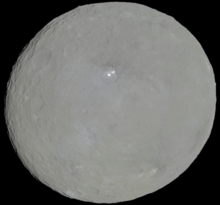Kerwan (crater)
 Kerwan crater. North is to the right. | |
| Feature type | Crater |
|---|---|
| Location | Ceres |
| Coordinates | 11°28′S 122°35′E / 11.47°S 122.58°ECoordinates: 11°28′S 122°35′E / 11.47°S 122.58°E |
| Diameter | 283.88 km |
| Depth | ~5 km |
| Eponym | Kerwan, Hopi spirit of the sprouting maize[1] |
Kerwan /ˈkɜːrwən/ is the largest confirmed crater and geological feature on Ceres. It was discovered on February 19, 2015 from Dawn images as it approached Ceres. The crater is distinctly shallow for its size, and lacks a central peak. A central peak might have been destroyed by a 15-kilometer-wide crater at the center of Kerwan. The crater is likely to be old relative to the rest of Ceres's surface, as it is overlapped by nearly every other feature in the area.
The crater is named after the Hopi spirit of sprouting maize, Kerwan. The name was approved by the IAU on July 3, 2015.[1]
See also
References
- 1 2 "Planetary Names: Crater, craters: Kerwan on Ceres". planetarynames.wr.usgs.go. IAU. Retrieved 17 July 2015.
This article is issued from Wikipedia - version of the 9/28/2016. The text is available under the Creative Commons Attribution/Share Alike but additional terms may apply for the media files.

